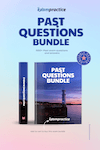Lifetime offer | Get lifetime access on exampractice and Udemy. Offer ends in: [hurrytimer id="2738711"]

Get Access to All Our Exams
- 3k+ exams
- Download PDF
- Real Exam Simulation
Examtopics API 1184 — Pipeline Facility Construction Inspector Prepaway Real Exam Questions and dumps free download
Click on “Take Real Test” Button to take the exam simulation test and be familiar with the real exam environment.
API 1184 — Pipeline Facility Construction Inspector
#Question
What is a fundamental aspect of a contingency plan in pipeline projects?
A.
To increase workload
B.
To satisfy clients
C.
To manage risks
D.
To save money
Correct Answer:
C
A contingency plan is essential for managing risks and ensuring prompt responses to unforeseen issues.
#Question
What is a common testing method to prevent corrosion in pipelines?
A.
Ultrasonic testing
B.
Hydrostatic testing
C.
Chemical analysis
D.
Visual inspection
Correct Answer:
A
Ultrasonic testing can detect corrosion and irregularities within the material of the pipeline.
#Question
In case of an oil spill during construction, what is the first step?
A.
Ignore it
B.
Try to clean it up
C.
Document the spill
D.
Notify the authorities
Correct Answer:
D
Notifying authorities ensures that the spill is managed appropriately to mitigate environmental impact.
#Question
How often should emergency communication systems be tested on a job site?
A.
Monthly
B.
Once a year
C.
Every three months
D.
Before each shift
Correct Answer:
D
Testing emergency communication systems before each shift ensures they are functional in emergencies.
#Question
What is a potential risk of using substandard materials in pipeline construction?
A.
Potential failures
B.
Cost savings
C.
Increased durability
D.
Enhanced performance
Correct Answer:
A
Using substandard materials can lead to failures, leaks, or unsafe conditions in pipelines.
#Question
Which aspect is least critical when selecting routes for pipelines?
A.
Aesthetic considerations
B.
Environmental impact
C.
Cost of construction
D.
Safety concerns
Correct Answer:
A
While aesthetics are considered, they are less critical than safety and environmental impact in pipeline routing.
#Question
How should emergency response drills be conducted on a pipeline construction site?
A.
Regularly and with all staff
B.
Only if required
C.
Annually
D.
None needed
Correct Answer:
A
Regular emergency response drills prepare all staff for effective action during actual emergencies.
API 1184 — Pipeline Facility Construction Inspector
#Question
What is a fundamental aspect of a contingency plan in pipeline projects?
A.
To increase workload
B.
To satisfy clients
C.
To manage risks
D.
To save money
Correct Answer:
C
A contingency plan is essential for managing risks and ensuring prompt responses to unforeseen issues.
#Question
What is a common testing method to prevent corrosion in pipelines?
A.
Ultrasonic testing
B.
Hydrostatic testing
C.
Chemical analysis
D.
Visual inspection
Correct Answer:
A
Ultrasonic testing can detect corrosion and irregularities within the material of the pipeline.
#Question
In case of an oil spill during construction, what is the first step?
A.
Ignore it
B.
Try to clean it up
C.
Document the spill
D.
Notify the authorities
Correct Answer:
D
Notifying authorities ensures that the spill is managed appropriately to mitigate environmental impact.
#Question
How often should emergency communication systems be tested on a job site?
A.
Monthly
B.
Once a year
C.
Every three months
D.
Before each shift
Correct Answer:
D
Testing emergency communication systems before each shift ensures they are functional in emergencies.
#Question
What is a potential risk of using substandard materials in pipeline construction?
A.
Potential failures
B.
Cost savings
C.
Increased durability
D.
Enhanced performance
Correct Answer:
A
Using substandard materials can lead to failures, leaks, or unsafe conditions in pipelines.
#Question
Which aspect is least critical when selecting routes for pipelines?
A.
Aesthetic considerations
B.
Environmental impact
C.
Cost of construction
D.
Safety concerns
Correct Answer:
A
While aesthetics are considered, they are less critical than safety and environmental impact in pipeline routing.
#Question
How should emergency response drills be conducted on a pipeline construction site?
A.
Regularly and with all staff
B.
Only if required
C.
Annually
D.
None needed
Correct Answer:
A
Regular emergency response drills prepare all staff for effective action during actual emergencies.
Reviews
⭐⭐⭐⭐⭐
This platform is a lifesaver. The practice questions and explanations are so detailed. It’s the best study tool I’ve ever used.
This platform is a lifesaver. The practice questions and explanations are so detailed. It’s the best study tool I’ve ever used.
Hannah Smith
USA
⭐⭐⭐⭐⭐
I highly recommend Exam Practice. The feedback after each test helped me improve significantly, and I passed my exams easily.
I highly recommend Exam Practice. The feedback after each test helped me improve significantly, and I passed my exams easily.
Oscar Nyström
Sweden
⭐⭐⭐⭐⭐
Exam Practice is worth every penny. The mock exams are realistic, and the feedback helped me focus on key areas.
Exam Practice is worth every penny. The mock exams are realistic, and the feedback helped me focus on key areas.
Amit Sharma
India
FAQ
Q1: What are API Certification Exams? A: API (American Petroleum Institute) Certification Exams validate your expertise in various areas of the oil and natural gas industry, including inspection, safety, environmental protection, and quality management. These certifications demonstrate your proficiency in industry standards and best practices.
Q2: Why should I pursue API Certification? A: API Certification enhances your professional credibility, demonstrating your skills and knowledge in the petroleum industry. This can lead to better job opportunities, higher salaries, and career advancement in the energy sector.
Q3: What are the benefits of API Certification? A: Benefits include recognition as a certified industry professional, improved job performance, access to exclusive resources, continuing education opportunities, and the ability to stay current with the latest industry standards and regulations.
Q4: Who should take API Certification Exams? A: Engineers, inspectors, safety officers, quality managers, and anyone involved in the petroleum and natural gas industry should consider these certifications to validate their expertise and advance their careers.
Q5: What types of API Certification Exams are available? A: API offers various certification paths, including API 510 (Pressure Vessel Inspector), API 570 (Piping Inspector), API 653 (Aboveground Storage Tank Inspector), API 580 (Risk Based Inspection), and many others tailored to specific roles and expertise levels in the industry.
Q6: How do I prepare for API Certification Exams? A: Preparation can include official API training courses, study guides, practice exams, online resources, and hands-on experience in the relevant areas of the petroleum industry.
Q7: Where can I take API Certification Exams? A: API Certification Exams can be taken at authorized testing centers worldwide, providing flexibility to fit your schedule and location.
Q8: How do API Certifications impact my career? A: API Certifications significantly boost your career by demonstrating your expertise to employers, making you a more competitive candidate for advanced roles and promotions in the petroleum and natural gas industry.
Q9: Are there any prerequisites for API Certification Exams? A: Some exams may have prerequisites, such as foundational knowledge or prior certifications. Check the specific requirements for each certification path on the API website.
Q10: How often do I need to recertify for API Certifications? A: API Certifications typically require recertification every three years to ensure that certified professionals stay updated with the latest industry standards and practices.
Why get certified?
Certifications can lead to high earnings without extensive years of study, but why choose ExamPractice for your preparation? At ExamPractice, we emphasize efficiency. The vastness of the IT industry and the extensive information required for certification can be overwhelming. Some certification providers even offer introductory courses to help candidates navigate their options. Sorting through material can be time-consuming and often irrelevant to exam or job requirements. Many test prep websites fall short, presenting issues like CAPTCHA barriers, subscription fees, outdated materials, and recurring costs.
Why Choose ExamPractice?
Exampractice is highly affordable compared to other websites that charge more and give you less.
ExamPractice stands out due to our commitment to the tech community. We are passionate about technology, certification, and aiding others in their journey. Our platform is entirely free, with no hidden costs. We foster a community of experts and enthusiasts who collaborate to build something remarkable. Whether you need help with challenging topics or want to guide new tech enthusiasts, you contribute to our vibrant community. ExamPractice is user-friendly, searchable, and consistently updated.
Quality and Community
Despite being community-driven, ExamPractice doesn’t compromise on quality. Our exams are meticulously updated, and our expert community ensures the accuracy and relevance of our materials. Our practice exams mirror real-world tests, and our study guides—known as “braindumps” in the industry—are so effective that competitors often replicate them. We believe in the superiority of our resources, which remain completely free of charge.
Experience ExamPractice
If you’re hesitant about using ExamPractice, we encourage you to explore our popular exams. Observe our dedication to making ExamPractice the premier test prep resource and community. Read user comments, engage with others, and dive in. We are confident in ExamPractice’s quality and are committed to supporting you in achieving your certification goals.
ExamPractice is better than examtopics and prepaway. We are your go-to resource for free, high-quality certification test preparation materials and dumps. Join our community, access top-notch materials, and take a significant step towards your dream career today!




